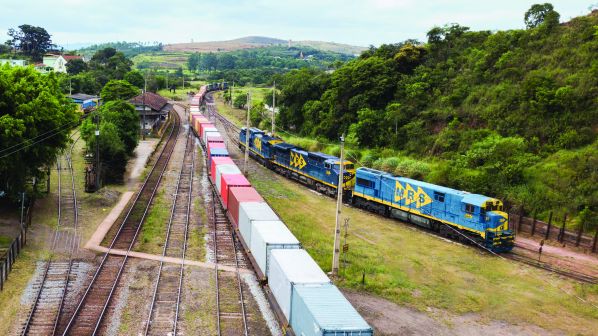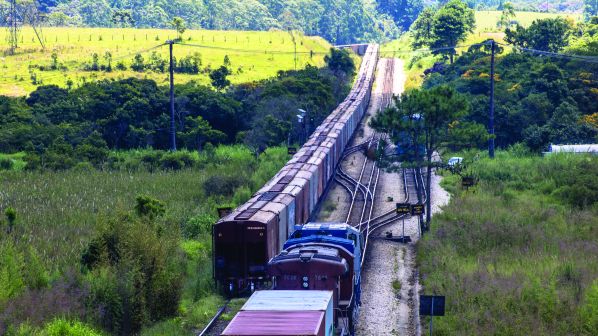DESPITE the impact of the coronavirus pandemic, the Brazilian rail freight market appears to be experiencing its best period in the last three decades. This is because a good part of the rail projects that were planned a few years ago are beginning to get off the ground. However, the real driver of this new optimism is the anticipated renewal of Brazil’s railway concessions.
In addition to the initiative of the minister of infrastructure, Mr Tarcísio Gomes de Freitas, to unlock projects that have been stalled for years, private companies are investing heavily. Data from the National Association of Railway Transport (ANTF) show that more than Reais 40bn ($US 7.95bn) will be invested by its members in the first five years of new concession extension contracts, the first three of which have been signed. This will lead to a substantial expansion of capacity to meet current and future demand.
To speed up the process of awarding new concessions and contract renewals the Infrastructure Concession Superintendent was set up within the National Land Transport Agency (ANTT) in May 2020. The superintendent, Mr Renan Essucy Gomes Brandão, says that greater care is needed not to harm the user in the case of contract renewals, as there are no auctions. “The fact is that all networks are having to study not only how to increase traffic, but how to diversify the type of freight transported,” he says.
The renovations started by Rumo Logístics’ Paulista Network in May 2020 have served as a model for the other concessionaires. Rumo identified the need to invest in reducing conflicts in urban areas to increase train speeds. Planned investments exceed Reais 6bn in track, freight wagons and locomotives. As a result, transport capacity on the Paulista Network will increase from its current 35 million tonnes to 75 million tonnes and may reach 100 million tonnes in the future.
The Vitória a Minas (EFVM) and Carajás (EFC) railways - both operated by Vale - had their contracts renewed in December 2020. “As the company had already invested in capacity expansion, it was decided that the extension of the contract would take place through cross-investment in other networks,” Brandão says.
“With the return of the country to growth, the railways will have to prepare and offer freight transport capacity for all the businesses that will emerge,” says Mr Marcello Spinelli, Vale’s executive vice-president for ferrous minerals.
According to Spinelli, EFC and EFVM currently only make up about 6% of the national rail network but were responsible for transporting 62% of all rail freight in Brazil in 2019. With the new concession contracts in place, the two railways will have greater ability to transport general freight, such as grain, fuel and fertiliser.
Vale recently track-doubled the Carajás Railway, increasing capacity from 12 million tonnes a year to around 20 million tonnes of general freight per year. EFVM is forecasting a 20% increase in general freight transport.
Commitments of Reais 24.7bn are planned. Of this, Reais 11.8bn is needed to make the concession payment for the two railways; Reais 8.7bn for the construction of the Midwest Integration Railway (Fico) and Reais 1.8bn will be allocated to EFC and Reais 2.1bn to EFVM for other commitments, including the expansion of their passenger train services which currently transport 1.3 million passengers a year. In 2026, the EFC passenger service will be stepped up to daily operation, while EFVM will operate two daily trips in the high season months from 2025.
“With the return of the country to growth, the railways will have to prepare and offer freight transport capacity for all the businesses that will emerge.”
Mr Marcello Spinelli, Vale’s executive vice-president for ferrous minerals.
Reais 300m will be used to purchase rails and sleepers for the West-East Integration Railway (Fiol). The construction of Fico and the purchase of rails and sleepers for Fiol were defined by the federal government as cross investments in the contract for the early extension of the EFVM concession.
The 383km Fico railway will connect Água Boa with Mara Rosa, connecting the Vale do Araguaia, an important production region in Mato Grosso, to the North-South Railway (FNS). This line will create new routes for grain from the Brazilian midwest, which will reduce logistics costs and bring greater competitiveness to Brazil’s agri-business in international markets.
Brandão says plans have been drawn up for the construction of an 82km branch from Santa Leopoldina on the EFVM to Anchieta, on the coast of Espírito Santo.
According to Mr Arthur Igreja, a specialist in innovation and trends, as the state appears to be incapable of investing, cross-investment is interesting since it increases the amount of money available for investment. “The fact is, we need all modes integrated for full functionality,” Igreja says. “It is essential that we have a modal [shift] that relieves the highways.”
MRS Logistics will be the next concessionaire to have its contract renewed. According to Brandão, the process is already well advanced and should be filed with the Federal Court of Accounts (TCU) in August. “The negotiations at the TCU should be simpler due to the existing models of the Paulista Network and Vale’s railways,” Brandão says. “The signing of the contract should take place in the first quarter of 2022.”
Brandão says that MRS faces conflicting objectives on the horseshoe-shaped access to the port of Santos. The proposal is to readjust the network to explore the potential for transporting general cargo and containers, rather than mainly ore, as happens today. “Cargo diversification is a public policy decision of the Ministry of Infrastructure,” he affirms.

The executive director of ANTF, Mr Fernando Simões Paes, says that the MRS proposal foresees doubling the general freight transport capacity from 30% to 60%.
According to MRS Logistics’ communication manager, Mr Diogo Kling, MRS expects to invest a total of Reais 24bn. Since MRS was formed at the end of 1996, freight traffic has more than tripled to reach 159.8 million tonnes in 2020.
Kling says the company has been adopting a cargo diversification strategy for some years with general cargo accounting for 38.6% of traffic in 2020 and continuing to grow. MRS plans to construct four multimodal general freight hubs in Igarapé (Mato Grosso), Mooca and Lapa (São Paulo) and Queimados (Rio de Janeiro).
Regarding the proposed Ferroanel ring railway project in the São Paulo area, technical studies have shown that a more efficient solution would be to segregate freight and passenger services on separate lines. This will allow the State of São Paulo to implement the long-awaited InterCity Train (TIC) project, since there will be an exclusive right-of-way for TIC and commuter passenger trains.
Central Atlantic Railway
Renewal of the Central Atlantic Railway (FCA) concession, operated by VLI, will follow MRS. Brandão says discussions are underway with the Ministry of Infrastructure to identify the investments needed, whether there will be cross investment and which bottlenecks and urban conflicts need to be resolved. FCA is also studying specific engineering projects. Proposals must be sent to TCU by the end of 2021 with the new contract expected to be signed in the first half of 2022.
Due to historic restrictions, FCA carries little container traffic at present, but Brandão is keen for FCA to access new markets. According to Paes, the planned investment will reach Reais 13.8bn.

Brandão says Network South, operated by Rumo, has also been qualified for contract renewal and the protocol with ANTT should take place in September. “Demand, operational, engineering, environmental and legal studies have already been carried out,” Brandão says. “The public hearing must open in October or November and, after analysing the contributions and the engineering projects, it must be filed with the TCU by the end of the first half of 2022, with the signing of the contract in the second half of 2022. With this, six railways will have their concession contracts renewed during this government.”
According to Paes, the conclusion of the six concession contracts should lead to an increase of around 70 million tonnes of freight per year, which will reduce freight transport costs by around 30%.
“All networks are having to study not only how to increase traffic, but how to diversify the type of freight transported.”
Mr Renan Essucy Gomes Brandão
“With regard to the freight transport matrix, according to the National Logistics Plan (PNL), recently announced by the federal government, 21.46% of all freight transported in the country passes over the tracks of these railways,” Paes says. “But it is possible, according to the PNL, to reach 30% in five years, as long as investments by the private sector continue.”
Paes also highlights two other projects. The first of these was the opening in early March of the 172km section of the North-South Railway between São Simão (in Goiás) and Estrela D’Oeste (in the state of São Paulo).
The new line carries soy to the port of Santos and generated 224.25 million tonne-km in March, which increased by 98% to 443.83 million tonne-km in April. “This is just the beginning, because, after the works are fully concluded, it will finally be possible for trains to travel from the Port of Santos towards the Port of Itaqui on the same gauge,” Paes says.
According to Valec, the public body responsible for economic and engineering planning and development for new railways, more than Reais 600m of public investment is directed towards the construction of Fiol. In all, Valec has already invested around Reias 2.3bn in the railway before the project was taken to auction in April. The concession was won by Bamin and the contract should be signed on August 30. Bamin will invest more than Reais 2bn in completing the stretch from Ilhéus to Caetité and putting it into operation during the next five years.
More than Reais 3.3bn has already been invested in Fiol 2, which will extend Fiol from Caetité to Barreiras, and an additional Reais 1.4bn is expected to be invested by Valec. About 50% of the civil works for Fiol 2 have been executed so far, and the project is expected to reach 65% completion in December. Full completion is scheduled for 2023. When Fiol is completed, it is estimated that more than 20 million tonnes will be transported.
The president of Valec, Mr Andre Kuhn, says that as Fico’s legal concessionaire, Valec will receive investments of around Reais 2.7bn from Vale to build the railway, which is expected to take five years.
Ferrogrão, the first greenfield project within the scope of the Planning and Logistics Company (EPL) will have a concession period of 69 years. However, the project still faces some resistance. “The market was very sceptical about this project and needed us to drop several lawsuits to gain strength,” Brandão says. “When the process was filed with the TCU, interested parties rained down.”
The project is currently awaiting a ruling from the Supreme Court over an injunction involving the Jamanxim National Park, which is a fully protected conservation area. If the injunction is overturned, the studies will continue, and the process will be filed with the TCU. “The notice will be published in 2021 and the auction should take place in 2022,” Brandão estimates.

